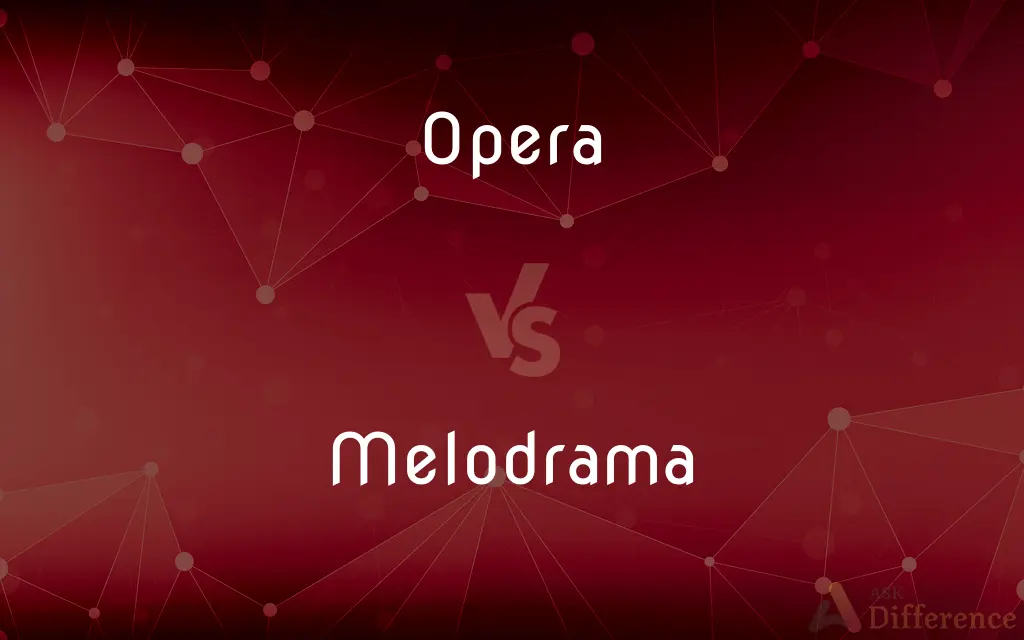Opera vs. Melodrama — What's the Difference?
By Fiza Rafique & Urooj Arif — Updated on March 12, 2024
Opera combines music, drama, and often dance, characterized by sung dialogue and orchestral accompaniment, while melodrama is a theatrical genre emphasizing exaggerated characters, emotions, and plot, often with spoken dialogue and musical background.

Difference Between Opera and Melodrama
Table of Contents
ADVERTISEMENT
Key Differences
Opera is a comprehensive art form that integrates music, singing, drama, and sometimes dance to narrate a story, entirely performed through music with orchestral accompaniment. Every word in an opera is sung, and the music plays a crucial role in conveying the emotional and narrative context. Melodrama, on the other hand, is a dramatic or literary work where the plot and action are emphasized over characterization, often featuring stereotypical characters and sensational events to appeal to the audience's emotions.
Operas are typically performed in opera houses with elaborate stage designs, costumes, and often include complex characters and intricate plots. The vocal technique in opera is highly specialized, with distinct roles like soprano, tenor, and baritone, and the performance is usually in the language of the original composition, such as Italian, German, or French. In melodramas, music is used to enhance the emotional response or signal character actions but is not the medium for dialogue, as the dialogue is typically spoken. Melodrama was particularly popular in the 18th and 19th centuries and is characterized by clear distinctions between good and evil, often leading to moral resolutions.
While opera is a synthesis of music and drama where music leads the narrative, melodrama uses music as an accompaniment to underscore the dramatic moments within a primarily spoken performance. Operas are known for their musical complexity and the virtuosity required of performers, whereas melodramas focus on straightforward storytelling with emphatic emotional appeal, making them more accessible to a broader audience. The grandeur and artistic depth of opera often contrast with the more direct and emotionally charged nature of melodrama, reflecting their different roles in the spectrum of performing arts.
Despite their differences, both opera and melodrama have significantly influenced the development of music, theatre, and cultural narratives, each offering unique ways of exploring human emotions, conflicts, and experiences through performance.
Comparison Chart
Medium
Music and singing with orchestral accompaniment.
Spoken dialogue with musical background.
ADVERTISEMENT
Emphasis
Musical composition, vocal performance, and dramatic narrative.
Exaggerated plot and characters, emotional appeal.
Vocal Style
Operatic singing, requiring specialized vocal training.
Spoken dialogue, with music underscoring emotion.
Performance Venue
Opera houses, theaters.
Theaters, varied performance spaces.
Historical Popularity
Enduring genre from the 16th century to present.
Peaked in the 18th and 19th centuries.
Compare with Definitions
Opera
A staged musical drama entirely sung.
Mozart's The Magic Flute is a renowned opera featuring a mix of high drama and comedy.
Melodrama
A dramatic work with exaggerated plot and characters.
The play The Poor of New York was a popular 19th-century melodrama focusing on social issues.
Opera
Features complex musical compositions.
Wagner's operas are known for their leitmotifs and rich orchestral textures.
Melodrama
Uses music to enhance emotional effect.
Silent films often used melodramatic music to underscore dramatic scenes.
Opera
Requires specialized vocal techniques.
Puccini's La Bohème showcases the expressive capabilities of the human voice through its characters.
Melodrama
Accessible and emotionally engaging.
Melodramatic elements in modern cinema can draw strong emotional responses from the audience.
Opera
Involves elaborate productions.
Verdi's Aida is often staged with grand sets and costumes to match its epic scale.
Melodrama
Emphasizes sensational events.
Many soap operas employ melodramatic narratives to engage viewers.
Opera
Performed in original languages.
Bizet's Carmen is typically performed in French, its original language.
Melodrama
Features clear moral distinctions.
Classic melodramas often involve a virtuous hero and a villainous antagonist.
Opera
The score of such a work.
Melodrama
A drama, such as a play, film, or television program, characterized by exaggerated emotions, stereotypical characters, and interpersonal conflicts.
Opera
Opera is a form of theatre in which music is a fundamental component and dramatic roles are taken by singers, but is distinct from musical theatre. Such a "work" (the literal translation of the Italian word "opera") is typically a collaboration between a composer and a librettist and incorporates a number of the performing arts, such as acting, scenery, costume, and sometimes dance or ballet.
Melodrama
In modern usage, a melodrama is a dramatic work wherein the plot, which is typically sensational and designed to appeal strongly to the emotions, takes precedence over detailed characterization. Melodramas typically concentrate on dialogue, which is often bombastic or excessively sentimental, rather than action.
Opera
A theatrical presentation in which a dramatic performance is set to music.
Melodrama
The dramatic genre characterized by this treatment.
Opera
A theater designed primarily for operas.
Melodrama
Behavior or occurrences having melodramatic characteristics.
Opera
A plural of opus.
Melodrama
A kind of drama having a musical accompaniment to intensify the effect of certain scenes.
Opera
A creative work, especially a musical composition numbered to designate the order of a composer's works.
Melodrama
(countable) A drama abounding in romantic sentiment and agonizing situations, with a musical accompaniment only in parts which are especially thrilling or pathetic. In opera, a passage in which the orchestra plays a somewhat descriptive accompaniment, while the actor speaks
The melodrama in the grave digging scene of Beethoven's "Fidelio".
Opera
(music) A theatrical work, combining drama, music, song and sometimes dance.
Melodrama
Any situation or action which is blown out of proportion.
Opera
(music) The score for such a work.
Melodrama
Formerly, a kind of drama having a musical accompaniment to intensify the effect of certain scenes. Now, a drama abounding in romantic sentiment and agonizing situations, with a musical accompaniment only in parts which are especially thrilling or pathetic. In opera, a passage in which the orchestra plays a somewhat descriptive accompaniment, while the actor speaks; as, the melodrama in the gravedigging scene of Beethoven's "Fidelio".
Opera
A building designed for the performance of such works; an opera house.
Melodrama
An extravagant comedy in which action is more salient than characterization
Opera
A company dedicated to performing such works.
Opera
(by extension) Any showy, melodramatic or unrealistic production resembling an opera.
Opera
Plural of opus; a collection of work.
Opera
A drama, either tragic or comic, of which music forms an essential part; a drama wholly or mostly sung, consisting of recitative, arias, choruses, duets, trios, etc., with orchestral accompaniment, preludes, and interludes, together with appropriate costumes, scenery, and action; a lyric drama.
Opera
The score of a musical drama, either written or in print; a play set to music.
Opera
The house where operas are exhibited.
Opera
A drama set to music; consists of singing with orchestral accompaniment and an orchestral overture and interludes
Opera
Theater where opera is performed
Common Curiosities
How does melodrama use music differently than opera?
In melodrama, music serves as a background element to enhance emotional responses and underscore dramatic moments, unlike opera, where music drives the narrative and dialogue.
Why is melodrama often viewed as less "serious" than opera?
Melodrama's emphasis on sensationalism, clear moral dichotomies, and its historical association with mass entertainment have led to it being viewed as less artistically "serious" than the complex art form of opera.
What distinguishes opera from other musical theater forms?
Opera is distinguished by its entirely sung dialogue, complex musical compositions, and the specialized vocal technique required of its performers.
What role does the orchestra play in opera?
The orchestra in opera provides the musical foundation for the performance, accompanying the singers and enhancing the emotional and narrative depth of the production.
Can an opera have melodramatic elements?
Yes, operas can incorporate melodramatic elements in their narratives and characterizations, blending high art with emotional appeal.
How has the perception of melodrama changed over time?
While melodrama was once a popular and respected genre, its name has come to be associated with over-the-top emotionality and simplistic moral narratives, impacting its contemporary perception.
How do opera singers train for their roles?
Opera singers undergo extensive vocal training to master the operatic singing technique, which requires control, range, and the ability to convey emotion through music.
Can melodramas be considered a form of social commentary?
Historically, many melodramas addressed social issues and injustices, using their exaggerated narratives to draw attention to real-world problems.
How do cultural differences influence opera productions?
Cultural differences can influence opera productions in terms of language, interpretation, thematic emphasis, and staging, reflecting the diverse ways audiences connect with operatic art.
Are there modern equivalents to melodrama?
Modern equivalents to melodrama include genres like soap operas and certain types of television dramas that focus on sensational plots and emotional narratives.
How have operatic themes evolved over time?
Operatic themes have evolved from mythological and historical subjects to include contemporary issues and more personal, psychological narratives, reflecting changes in society and art.
What challenges do opera performers face?
Opera performers face challenges such as mastering difficult compositions, conveying emotion through music, and maintaining vocal health amidst rigorous performance schedules.
What is the significance of staging in opera?
Staging in opera, including set design, costumes, and lighting, plays a crucial role in bringing the story to life and enhancing the overall aesthetic and emotional experience.
How do modern productions reinterpret traditional melodramas?
Modern productions often reinterpret traditional melodramas by updating settings, themes, or characterizations to resonate with contemporary audiences and offer new perspectives.
What is the role of the libretto in opera?
The libretto in opera serves as the text or script, providing the narrative framework, character dialogue, and lyrical content for the music, essential for understanding the story and characters.
Share Your Discovery

Previous Comparison
Thoracotomy vs. Thoracentesis
Next Comparison
Divergence vs. ConvergenceAuthor Spotlight
Written by
Fiza RafiqueFiza Rafique is a skilled content writer at AskDifference.com, where she meticulously refines and enhances written pieces. Drawing from her vast editorial expertise, Fiza ensures clarity, accuracy, and precision in every article. Passionate about language, she continually seeks to elevate the quality of content for readers worldwide.
Co-written by
Urooj ArifUrooj is a skilled content writer at Ask Difference, known for her exceptional ability to simplify complex topics into engaging and informative content. With a passion for research and a flair for clear, concise writing, she consistently delivers articles that resonate with our diverse audience.














































